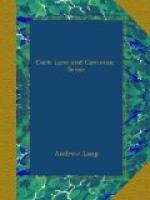A clasped knife opened in the pocket of Christina Shaw, and her glove falling, it was lifted by a hand invisible to several persons present. One is reminded of the nursery rhyme,—’the dish it ran after the spoon’. In the presence of Home, even a bookcase is said to have forgotten itself, and committed the most deplorable excesses. In the article of Mr. Myers, already cited, we find a table which jumps by the bedside of a dying man. {124} A handbag of Miss Power’s flies from an arm-chair, and hides under a table; raps are heard; all this when Miss Power is alone. Mr. H. W. Gore Graham sees a table move about. A heavy table of Mr. G. A. Armstrong’s rises high in the air. A tea-table ‘runs after’ Professor Alexander, and ‘attempts to hem me in,’ this was at Rio de Janeiro, in the Davis family, where raps ’ranged from hardly perceptible ticks up to resounding blows, such as might be struck by a wooden mallet’. A Mr. H. falls into convulsions, during which all sorts of things fly about. All these stories closely correspond to the tales in Increase Mather’s Remarkable Providences in New England, in which the phenomena sometimes occur in the presence of an epileptic and convulsed boy, about 1680. To take one classic French case, Segrais declares that a M. Patris was lodged in the Chateau d’Egmont. At dinner-time, he went into the room of a friend, whom he found lost in the utmost astonishment. A huge book, Cardan’s De Subtilitate, had flown at him across the room, and the leaves had turned, under invisible fingers! There are plenty of bogles in that book. M. Patris laughed at this tale, and went into the gallery, when a large chair, so heavy that two men could scarcely lift it, shook itself and came at him. He remonstrated, and the chair returned to its usual position. ’This made a deep impression on M. Patris, and contributed in no slight degree to make him a converted character’— a le faire devenir devot. {125a}
Tales like this, with that odd uniformity of tone and detail which makes them curious, might be collected from old literature to any extent. Thus, among the sounds usually called ‘rappings,’ Mr. Crookes mentions, as matter within his own experience, ’a cracking like that heard when a frictional machine is at work’. Now, as may be read in Southey’s Life of Wesley and in Clarke’s Memoirs of the Wesleys, this was the very noise which usually heralded the arrival of ‘Jeffrey,’ as they called the Epworth ‘spirit’. {125b} It has been alleged that the charming and ill-fated Hetty Wesley caused the disturbances. If so (and Dr. Salmon, who supports this thesis, does not even hazard a guess as to the modus operandi), Hetty must have been familiar with almost the whole extent of psychical literature, for she scarcely left a single phenomenon unrepresented. It does not appear that she supplied visible ‘hands’. We have seen Glanvill lay stress on the apparition of a hand. In the case of the devil of Glenluce,




